E Commerce and Chief Legal Issues
VerifiedAdded on 2020/04/15
|11
|2894
|126
AI Summary
Contribute Materials
Your contribution can guide someone’s learning journey. Share your
documents today.
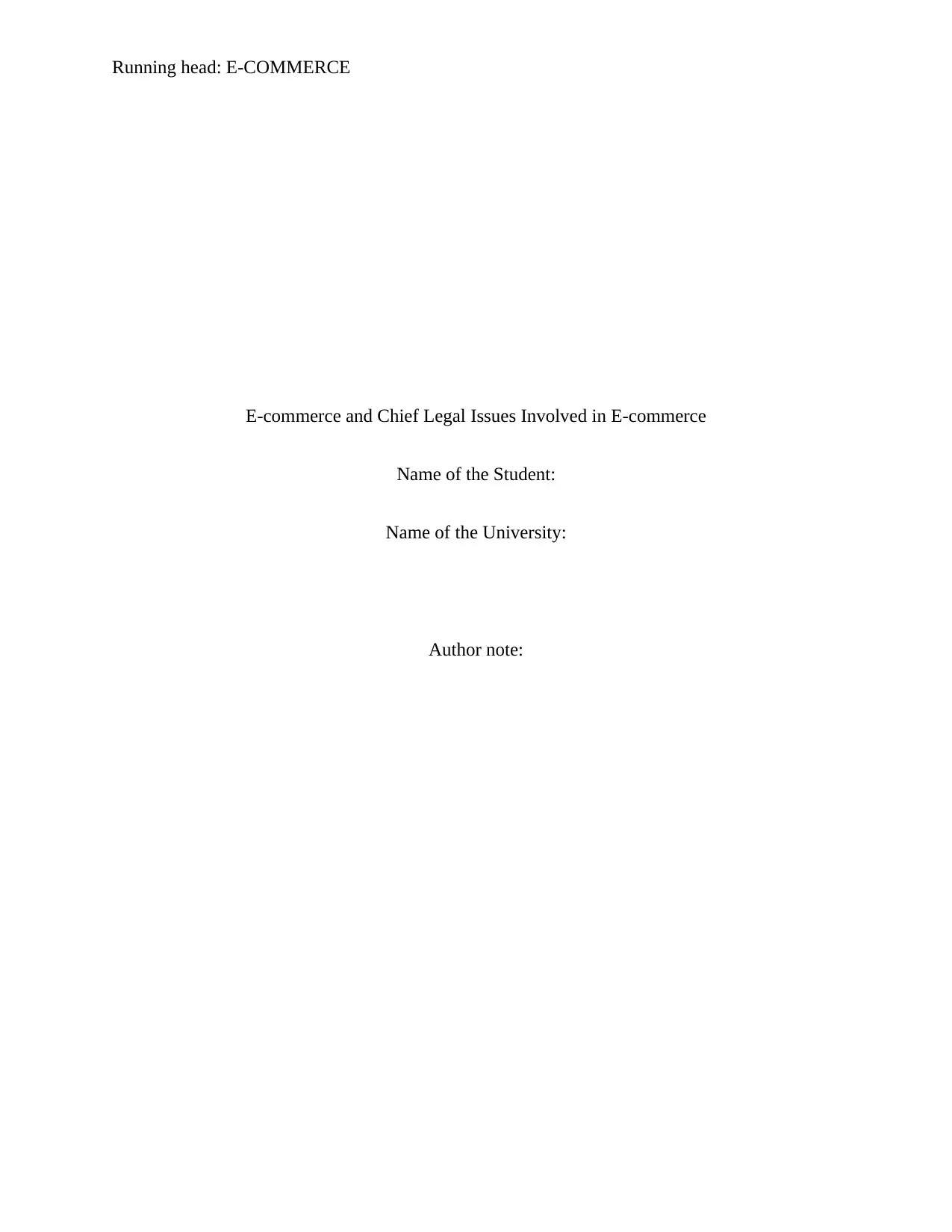
Running head: E-COMMERCE
E-commerce and Chief Legal Issues Involved in E-commerce
Name of the Student:
Name of the University:
Author note:
E-commerce and Chief Legal Issues Involved in E-commerce
Name of the Student:
Name of the University:
Author note:
Secure Best Marks with AI Grader
Need help grading? Try our AI Grader for instant feedback on your assignments.
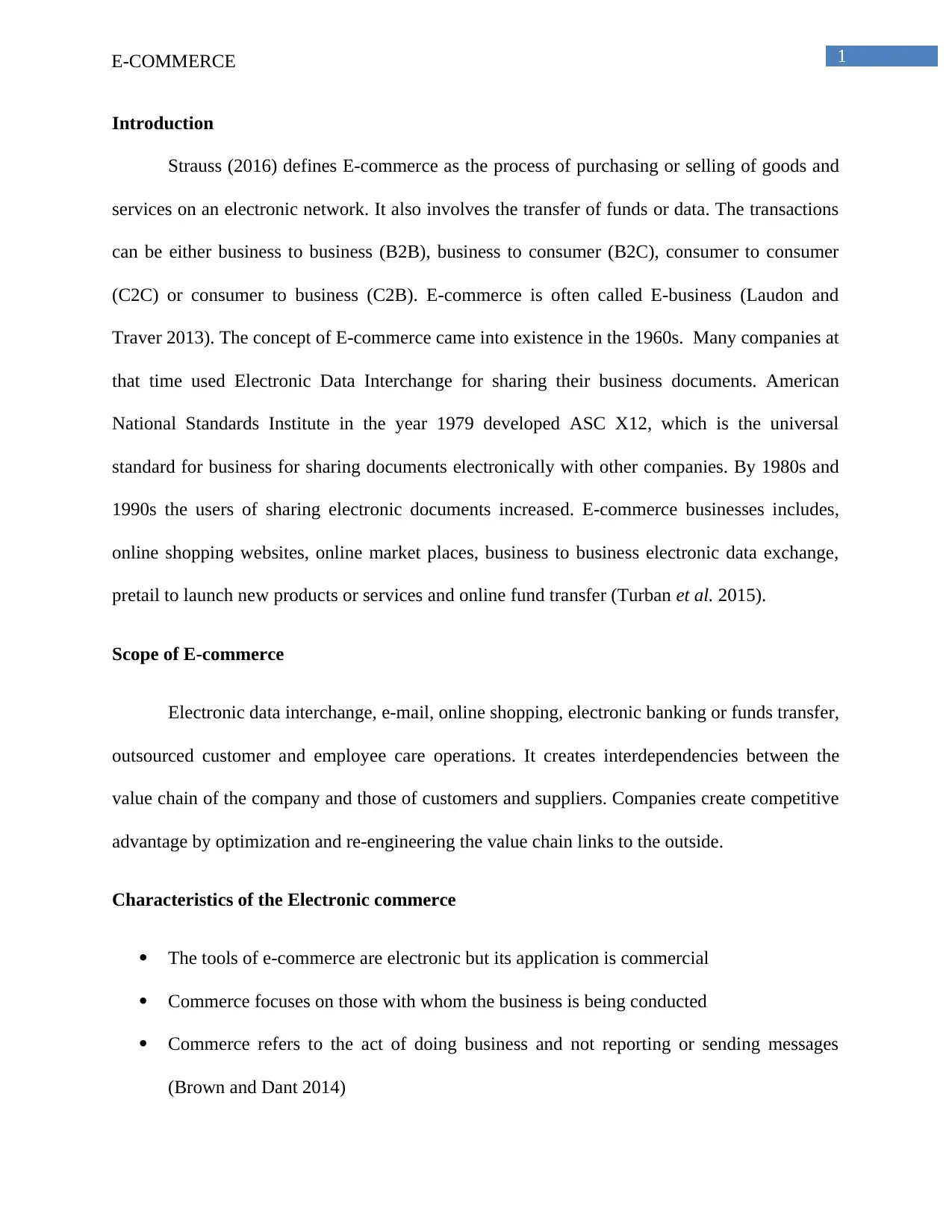
1E-COMMERCE
Introduction
Strauss (2016) defines E-commerce as the process of purchasing or selling of goods and
services on an electronic network. It also involves the transfer of funds or data. The transactions
can be either business to business (B2B), business to consumer (B2C), consumer to consumer
(C2C) or consumer to business (C2B). E-commerce is often called E-business (Laudon and
Traver 2013). The concept of E-commerce came into existence in the 1960s. Many companies at
that time used Electronic Data Interchange for sharing their business documents. American
National Standards Institute in the year 1979 developed ASC X12, which is the universal
standard for business for sharing documents electronically with other companies. By 1980s and
1990s the users of sharing electronic documents increased. E-commerce businesses includes,
online shopping websites, online market places, business to business electronic data exchange,
pretail to launch new products or services and online fund transfer (Turban et al. 2015).
Scope of E-commerce
Electronic data interchange, e-mail, online shopping, electronic banking or funds transfer,
outsourced customer and employee care operations. It creates interdependencies between the
value chain of the company and those of customers and suppliers. Companies create competitive
advantage by optimization and re-engineering the value chain links to the outside.
Characteristics of the Electronic commerce
The tools of e-commerce are electronic but its application is commercial
Commerce focuses on those with whom the business is being conducted
Commerce refers to the act of doing business and not reporting or sending messages
(Brown and Dant 2014)
Introduction
Strauss (2016) defines E-commerce as the process of purchasing or selling of goods and
services on an electronic network. It also involves the transfer of funds or data. The transactions
can be either business to business (B2B), business to consumer (B2C), consumer to consumer
(C2C) or consumer to business (C2B). E-commerce is often called E-business (Laudon and
Traver 2013). The concept of E-commerce came into existence in the 1960s. Many companies at
that time used Electronic Data Interchange for sharing their business documents. American
National Standards Institute in the year 1979 developed ASC X12, which is the universal
standard for business for sharing documents electronically with other companies. By 1980s and
1990s the users of sharing electronic documents increased. E-commerce businesses includes,
online shopping websites, online market places, business to business electronic data exchange,
pretail to launch new products or services and online fund transfer (Turban et al. 2015).
Scope of E-commerce
Electronic data interchange, e-mail, online shopping, electronic banking or funds transfer,
outsourced customer and employee care operations. It creates interdependencies between the
value chain of the company and those of customers and suppliers. Companies create competitive
advantage by optimization and re-engineering the value chain links to the outside.
Characteristics of the Electronic commerce
The tools of e-commerce are electronic but its application is commercial
Commerce focuses on those with whom the business is being conducted
Commerce refers to the act of doing business and not reporting or sending messages
(Brown and Dant 2014)
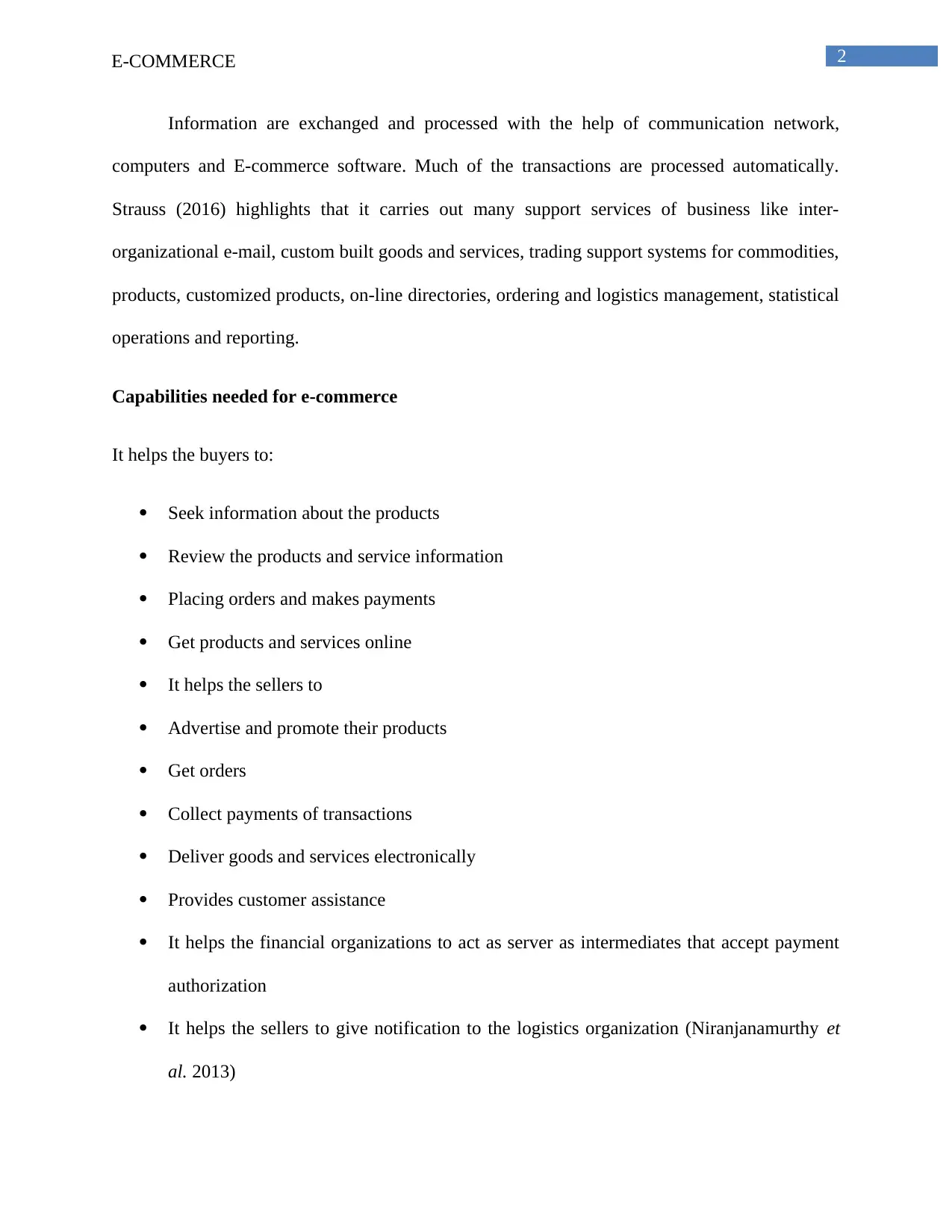
2E-COMMERCE
Information are exchanged and processed with the help of communication network,
computers and E-commerce software. Much of the transactions are processed automatically.
Strauss (2016) highlights that it carries out many support services of business like inter-
organizational e-mail, custom built goods and services, trading support systems for commodities,
products, customized products, on-line directories, ordering and logistics management, statistical
operations and reporting.
Capabilities needed for e-commerce
It helps the buyers to:
Seek information about the products
Review the products and service information
Placing orders and makes payments
Get products and services online
It helps the sellers to
Advertise and promote their products
Get orders
Collect payments of transactions
Deliver goods and services electronically
Provides customer assistance
It helps the financial organizations to act as server as intermediates that accept payment
authorization
It helps the sellers to give notification to the logistics organization (Niranjanamurthy et
al. 2013)
Information are exchanged and processed with the help of communication network,
computers and E-commerce software. Much of the transactions are processed automatically.
Strauss (2016) highlights that it carries out many support services of business like inter-
organizational e-mail, custom built goods and services, trading support systems for commodities,
products, customized products, on-line directories, ordering and logistics management, statistical
operations and reporting.
Capabilities needed for e-commerce
It helps the buyers to:
Seek information about the products
Review the products and service information
Placing orders and makes payments
Get products and services online
It helps the sellers to
Advertise and promote their products
Get orders
Collect payments of transactions
Deliver goods and services electronically
Provides customer assistance
It helps the financial organizations to act as server as intermediates that accept payment
authorization
It helps the sellers to give notification to the logistics organization (Niranjanamurthy et
al. 2013)
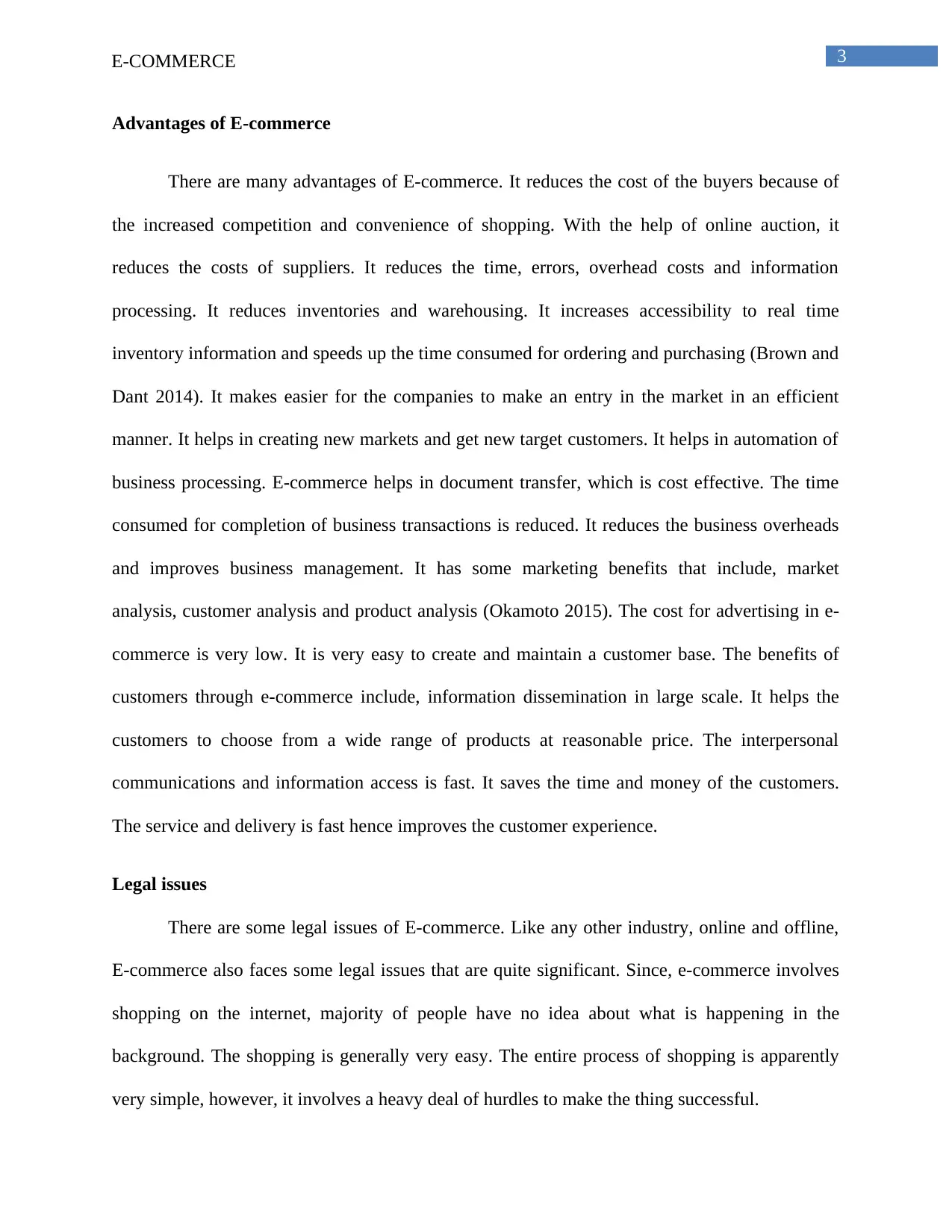
3E-COMMERCE
Advantages of E-commerce
There are many advantages of E-commerce. It reduces the cost of the buyers because of
the increased competition and convenience of shopping. With the help of online auction, it
reduces the costs of suppliers. It reduces the time, errors, overhead costs and information
processing. It reduces inventories and warehousing. It increases accessibility to real time
inventory information and speeds up the time consumed for ordering and purchasing (Brown and
Dant 2014). It makes easier for the companies to make an entry in the market in an efficient
manner. It helps in creating new markets and get new target customers. It helps in automation of
business processing. E-commerce helps in document transfer, which is cost effective. The time
consumed for completion of business transactions is reduced. It reduces the business overheads
and improves business management. It has some marketing benefits that include, market
analysis, customer analysis and product analysis (Okamoto 2015). The cost for advertising in e-
commerce is very low. It is very easy to create and maintain a customer base. The benefits of
customers through e-commerce include, information dissemination in large scale. It helps the
customers to choose from a wide range of products at reasonable price. The interpersonal
communications and information access is fast. It saves the time and money of the customers.
The service and delivery is fast hence improves the customer experience.
Legal issues
There are some legal issues of E-commerce. Like any other industry, online and offline,
E-commerce also faces some legal issues that are quite significant. Since, e-commerce involves
shopping on the internet, majority of people have no idea about what is happening in the
background. The shopping is generally very easy. The entire process of shopping is apparently
very simple, however, it involves a heavy deal of hurdles to make the thing successful.
Advantages of E-commerce
There are many advantages of E-commerce. It reduces the cost of the buyers because of
the increased competition and convenience of shopping. With the help of online auction, it
reduces the costs of suppliers. It reduces the time, errors, overhead costs and information
processing. It reduces inventories and warehousing. It increases accessibility to real time
inventory information and speeds up the time consumed for ordering and purchasing (Brown and
Dant 2014). It makes easier for the companies to make an entry in the market in an efficient
manner. It helps in creating new markets and get new target customers. It helps in automation of
business processing. E-commerce helps in document transfer, which is cost effective. The time
consumed for completion of business transactions is reduced. It reduces the business overheads
and improves business management. It has some marketing benefits that include, market
analysis, customer analysis and product analysis (Okamoto 2015). The cost for advertising in e-
commerce is very low. It is very easy to create and maintain a customer base. The benefits of
customers through e-commerce include, information dissemination in large scale. It helps the
customers to choose from a wide range of products at reasonable price. The interpersonal
communications and information access is fast. It saves the time and money of the customers.
The service and delivery is fast hence improves the customer experience.
Legal issues
There are some legal issues of E-commerce. Like any other industry, online and offline,
E-commerce also faces some legal issues that are quite significant. Since, e-commerce involves
shopping on the internet, majority of people have no idea about what is happening in the
background. The shopping is generally very easy. The entire process of shopping is apparently
very simple, however, it involves a heavy deal of hurdles to make the thing successful.
Secure Best Marks with AI Grader
Need help grading? Try our AI Grader for instant feedback on your assignments.
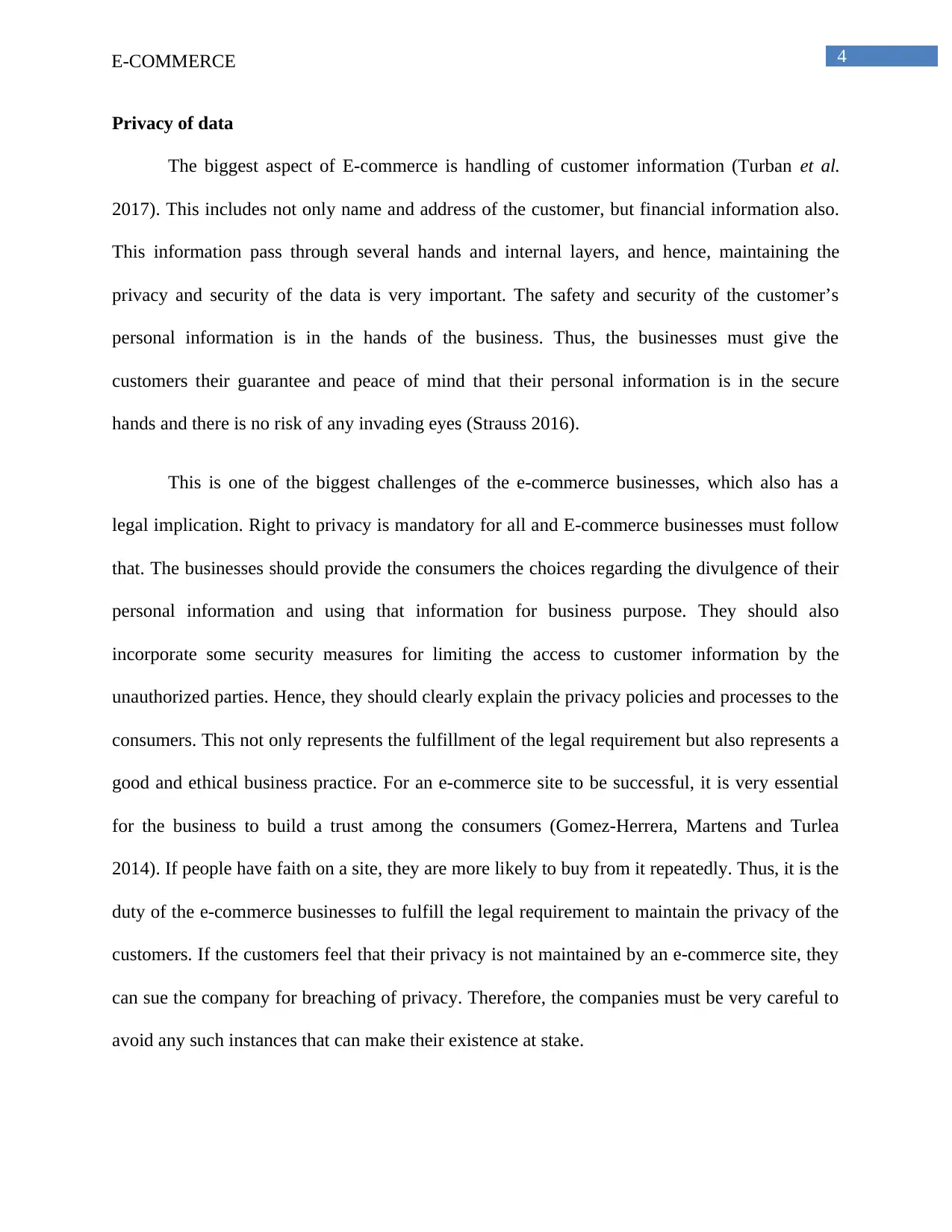
4E-COMMERCE
Privacy of data
The biggest aspect of E-commerce is handling of customer information (Turban et al.
2017). This includes not only name and address of the customer, but financial information also.
This information pass through several hands and internal layers, and hence, maintaining the
privacy and security of the data is very important. The safety and security of the customer’s
personal information is in the hands of the business. Thus, the businesses must give the
customers their guarantee and peace of mind that their personal information is in the secure
hands and there is no risk of any invading eyes (Strauss 2016).
This is one of the biggest challenges of the e-commerce businesses, which also has a
legal implication. Right to privacy is mandatory for all and E-commerce businesses must follow
that. The businesses should provide the consumers the choices regarding the divulgence of their
personal information and using that information for business purpose. They should also
incorporate some security measures for limiting the access to customer information by the
unauthorized parties. Hence, they should clearly explain the privacy policies and processes to the
consumers. This not only represents the fulfillment of the legal requirement but also represents a
good and ethical business practice. For an e-commerce site to be successful, it is very essential
for the business to build a trust among the consumers (Gomez-Herrera, Martens and Turlea
2014). If people have faith on a site, they are more likely to buy from it repeatedly. Thus, it is the
duty of the e-commerce businesses to fulfill the legal requirement to maintain the privacy of the
customers. If the customers feel that their privacy is not maintained by an e-commerce site, they
can sue the company for breaching of privacy. Therefore, the companies must be very careful to
avoid any such instances that can make their existence at stake.
Privacy of data
The biggest aspect of E-commerce is handling of customer information (Turban et al.
2017). This includes not only name and address of the customer, but financial information also.
This information pass through several hands and internal layers, and hence, maintaining the
privacy and security of the data is very important. The safety and security of the customer’s
personal information is in the hands of the business. Thus, the businesses must give the
customers their guarantee and peace of mind that their personal information is in the secure
hands and there is no risk of any invading eyes (Strauss 2016).
This is one of the biggest challenges of the e-commerce businesses, which also has a
legal implication. Right to privacy is mandatory for all and E-commerce businesses must follow
that. The businesses should provide the consumers the choices regarding the divulgence of their
personal information and using that information for business purpose. They should also
incorporate some security measures for limiting the access to customer information by the
unauthorized parties. Hence, they should clearly explain the privacy policies and processes to the
consumers. This not only represents the fulfillment of the legal requirement but also represents a
good and ethical business practice. For an e-commerce site to be successful, it is very essential
for the business to build a trust among the consumers (Gomez-Herrera, Martens and Turlea
2014). If people have faith on a site, they are more likely to buy from it repeatedly. Thus, it is the
duty of the e-commerce businesses to fulfill the legal requirement to maintain the privacy of the
customers. If the customers feel that their privacy is not maintained by an e-commerce site, they
can sue the company for breaching of privacy. Therefore, the companies must be very careful to
avoid any such instances that can make their existence at stake.
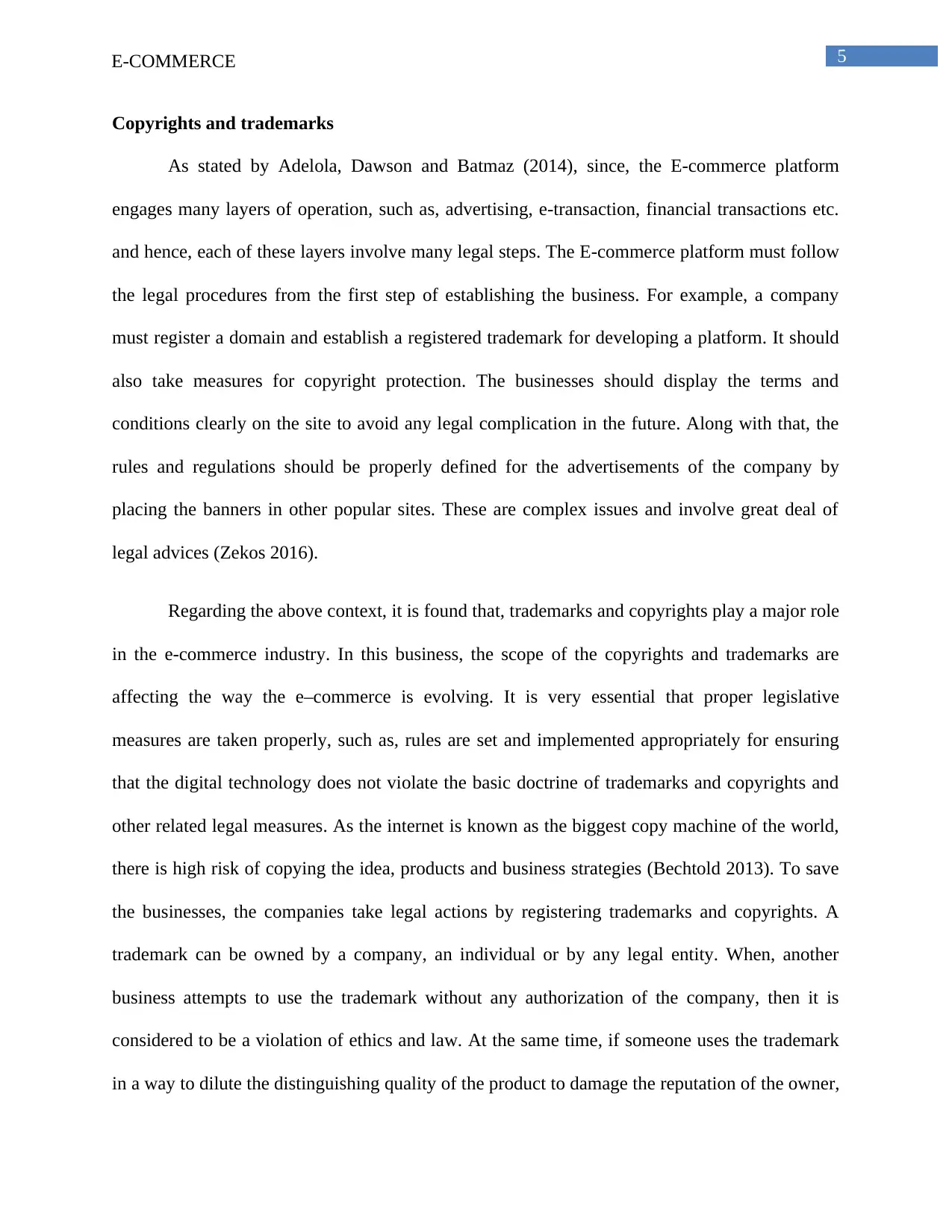
5E-COMMERCE
Copyrights and trademarks
As stated by Adelola, Dawson and Batmaz (2014), since, the E-commerce platform
engages many layers of operation, such as, advertising, e-transaction, financial transactions etc.
and hence, each of these layers involve many legal steps. The E-commerce platform must follow
the legal procedures from the first step of establishing the business. For example, a company
must register a domain and establish a registered trademark for developing a platform. It should
also take measures for copyright protection. The businesses should display the terms and
conditions clearly on the site to avoid any legal complication in the future. Along with that, the
rules and regulations should be properly defined for the advertisements of the company by
placing the banners in other popular sites. These are complex issues and involve great deal of
legal advices (Zekos 2016).
Regarding the above context, it is found that, trademarks and copyrights play a major role
in the e-commerce industry. In this business, the scope of the copyrights and trademarks are
affecting the way the e–commerce is evolving. It is very essential that proper legislative
measures are taken properly, such as, rules are set and implemented appropriately for ensuring
that the digital technology does not violate the basic doctrine of trademarks and copyrights and
other related legal measures. As the internet is known as the biggest copy machine of the world,
there is high risk of copying the idea, products and business strategies (Bechtold 2013). To save
the businesses, the companies take legal actions by registering trademarks and copyrights. A
trademark can be owned by a company, an individual or by any legal entity. When, another
business attempts to use the trademark without any authorization of the company, then it is
considered to be a violation of ethics and law. At the same time, if someone uses the trademark
in a way to dilute the distinguishing quality of the product to damage the reputation of the owner,
Copyrights and trademarks
As stated by Adelola, Dawson and Batmaz (2014), since, the E-commerce platform
engages many layers of operation, such as, advertising, e-transaction, financial transactions etc.
and hence, each of these layers involve many legal steps. The E-commerce platform must follow
the legal procedures from the first step of establishing the business. For example, a company
must register a domain and establish a registered trademark for developing a platform. It should
also take measures for copyright protection. The businesses should display the terms and
conditions clearly on the site to avoid any legal complication in the future. Along with that, the
rules and regulations should be properly defined for the advertisements of the company by
placing the banners in other popular sites. These are complex issues and involve great deal of
legal advices (Zekos 2016).
Regarding the above context, it is found that, trademarks and copyrights play a major role
in the e-commerce industry. In this business, the scope of the copyrights and trademarks are
affecting the way the e–commerce is evolving. It is very essential that proper legislative
measures are taken properly, such as, rules are set and implemented appropriately for ensuring
that the digital technology does not violate the basic doctrine of trademarks and copyrights and
other related legal measures. As the internet is known as the biggest copy machine of the world,
there is high risk of copying the idea, products and business strategies (Bechtold 2013). To save
the businesses, the companies take legal actions by registering trademarks and copyrights. A
trademark can be owned by a company, an individual or by any legal entity. When, another
business attempts to use the trademark without any authorization of the company, then it is
considered to be a violation of ethics and law. At the same time, if someone uses the trademark
in a way to dilute the distinguishing quality of the product to damage the reputation of the owner,
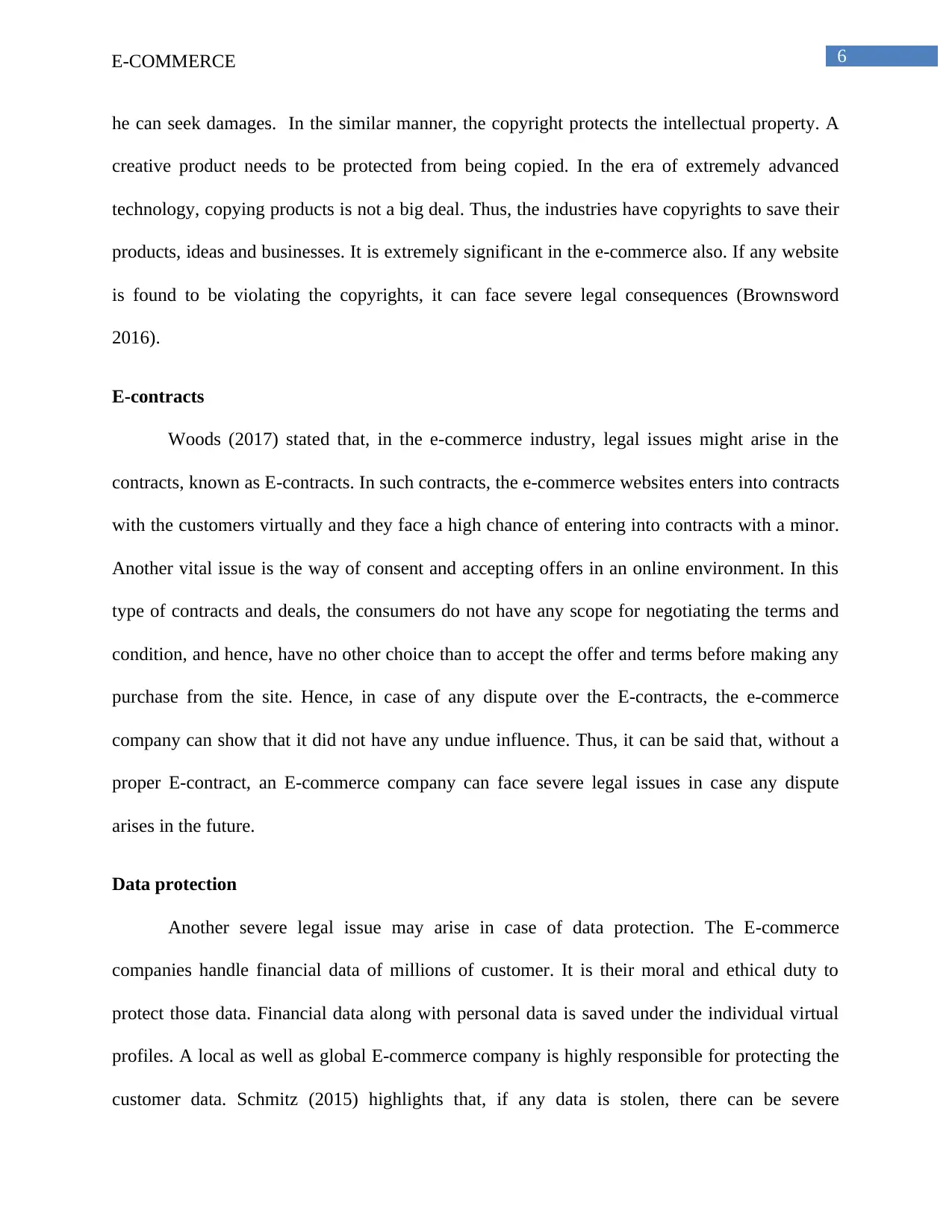
6E-COMMERCE
he can seek damages. In the similar manner, the copyright protects the intellectual property. A
creative product needs to be protected from being copied. In the era of extremely advanced
technology, copying products is not a big deal. Thus, the industries have copyrights to save their
products, ideas and businesses. It is extremely significant in the e-commerce also. If any website
is found to be violating the copyrights, it can face severe legal consequences (Brownsword
2016).
E-contracts
Woods (2017) stated that, in the e-commerce industry, legal issues might arise in the
contracts, known as E-contracts. In such contracts, the e-commerce websites enters into contracts
with the customers virtually and they face a high chance of entering into contracts with a minor.
Another vital issue is the way of consent and accepting offers in an online environment. In this
type of contracts and deals, the consumers do not have any scope for negotiating the terms and
condition, and hence, have no other choice than to accept the offer and terms before making any
purchase from the site. Hence, in case of any dispute over the E-contracts, the e-commerce
company can show that it did not have any undue influence. Thus, it can be said that, without a
proper E-contract, an E-commerce company can face severe legal issues in case any dispute
arises in the future.
Data protection
Another severe legal issue may arise in case of data protection. The E-commerce
companies handle financial data of millions of customer. It is their moral and ethical duty to
protect those data. Financial data along with personal data is saved under the individual virtual
profiles. A local as well as global E-commerce company is highly responsible for protecting the
customer data. Schmitz (2015) highlights that, if any data is stolen, there can be severe
he can seek damages. In the similar manner, the copyright protects the intellectual property. A
creative product needs to be protected from being copied. In the era of extremely advanced
technology, copying products is not a big deal. Thus, the industries have copyrights to save their
products, ideas and businesses. It is extremely significant in the e-commerce also. If any website
is found to be violating the copyrights, it can face severe legal consequences (Brownsword
2016).
E-contracts
Woods (2017) stated that, in the e-commerce industry, legal issues might arise in the
contracts, known as E-contracts. In such contracts, the e-commerce websites enters into contracts
with the customers virtually and they face a high chance of entering into contracts with a minor.
Another vital issue is the way of consent and accepting offers in an online environment. In this
type of contracts and deals, the consumers do not have any scope for negotiating the terms and
condition, and hence, have no other choice than to accept the offer and terms before making any
purchase from the site. Hence, in case of any dispute over the E-contracts, the e-commerce
company can show that it did not have any undue influence. Thus, it can be said that, without a
proper E-contract, an E-commerce company can face severe legal issues in case any dispute
arises in the future.
Data protection
Another severe legal issue may arise in case of data protection. The E-commerce
companies handle financial data of millions of customer. It is their moral and ethical duty to
protect those data. Financial data along with personal data is saved under the individual virtual
profiles. A local as well as global E-commerce company is highly responsible for protecting the
customer data. Schmitz (2015) highlights that, if any data is stolen, there can be severe
Paraphrase This Document
Need a fresh take? Get an instant paraphrase of this document with our AI Paraphraser
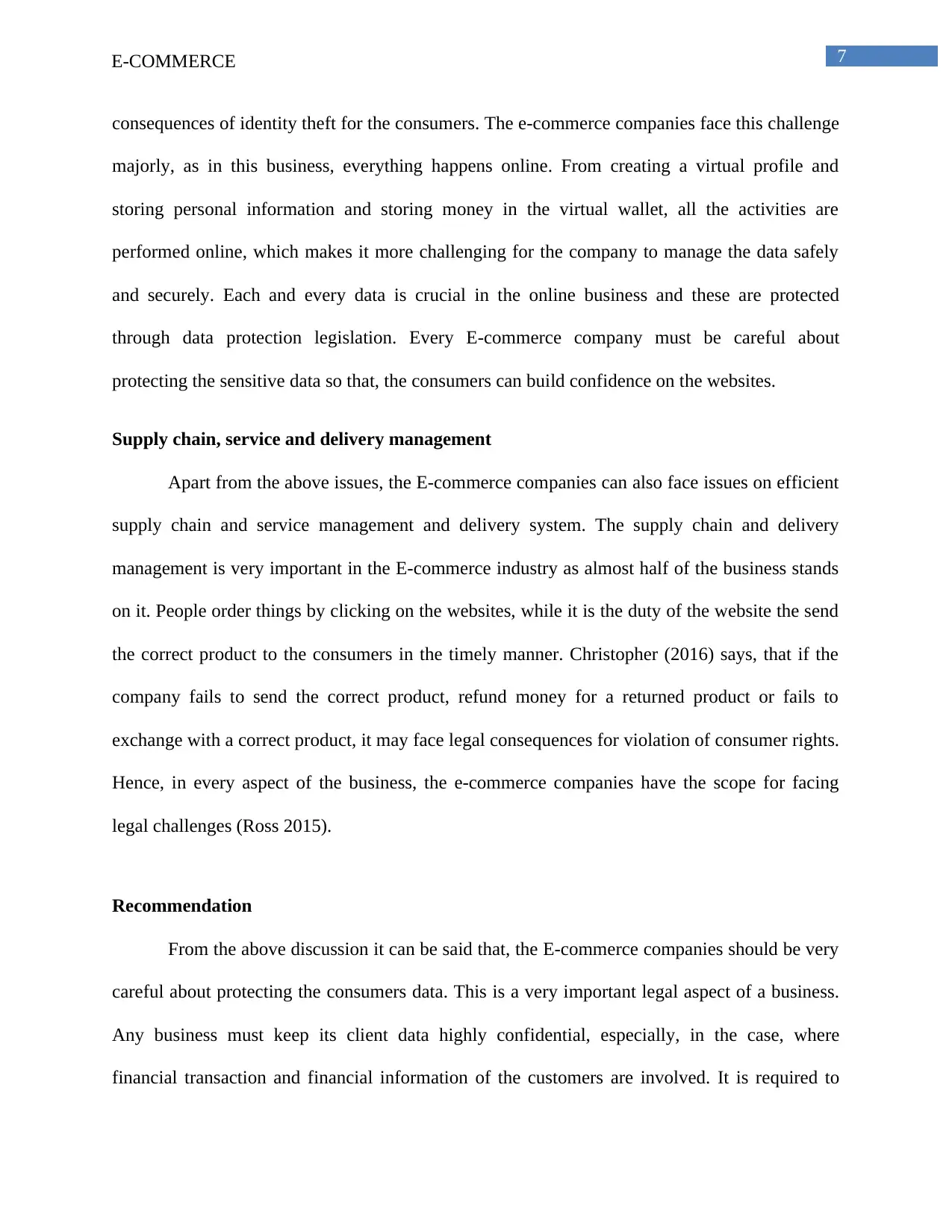
7E-COMMERCE
consequences of identity theft for the consumers. The e-commerce companies face this challenge
majorly, as in this business, everything happens online. From creating a virtual profile and
storing personal information and storing money in the virtual wallet, all the activities are
performed online, which makes it more challenging for the company to manage the data safely
and securely. Each and every data is crucial in the online business and these are protected
through data protection legislation. Every E-commerce company must be careful about
protecting the sensitive data so that, the consumers can build confidence on the websites.
Supply chain, service and delivery management
Apart from the above issues, the E-commerce companies can also face issues on efficient
supply chain and service management and delivery system. The supply chain and delivery
management is very important in the E-commerce industry as almost half of the business stands
on it. People order things by clicking on the websites, while it is the duty of the website the send
the correct product to the consumers in the timely manner. Christopher (2016) says, that if the
company fails to send the correct product, refund money for a returned product or fails to
exchange with a correct product, it may face legal consequences for violation of consumer rights.
Hence, in every aspect of the business, the e-commerce companies have the scope for facing
legal challenges (Ross 2015).
Recommendation
From the above discussion it can be said that, the E-commerce companies should be very
careful about protecting the consumers data. This is a very important legal aspect of a business.
Any business must keep its client data highly confidential, especially, in the case, where
financial transaction and financial information of the customers are involved. It is required to
consequences of identity theft for the consumers. The e-commerce companies face this challenge
majorly, as in this business, everything happens online. From creating a virtual profile and
storing personal information and storing money in the virtual wallet, all the activities are
performed online, which makes it more challenging for the company to manage the data safely
and securely. Each and every data is crucial in the online business and these are protected
through data protection legislation. Every E-commerce company must be careful about
protecting the sensitive data so that, the consumers can build confidence on the websites.
Supply chain, service and delivery management
Apart from the above issues, the E-commerce companies can also face issues on efficient
supply chain and service management and delivery system. The supply chain and delivery
management is very important in the E-commerce industry as almost half of the business stands
on it. People order things by clicking on the websites, while it is the duty of the website the send
the correct product to the consumers in the timely manner. Christopher (2016) says, that if the
company fails to send the correct product, refund money for a returned product or fails to
exchange with a correct product, it may face legal consequences for violation of consumer rights.
Hence, in every aspect of the business, the e-commerce companies have the scope for facing
legal challenges (Ross 2015).
Recommendation
From the above discussion it can be said that, the E-commerce companies should be very
careful about protecting the consumers data. This is a very important legal aspect of a business.
Any business must keep its client data highly confidential, especially, in the case, where
financial transaction and financial information of the customers are involved. It is required to
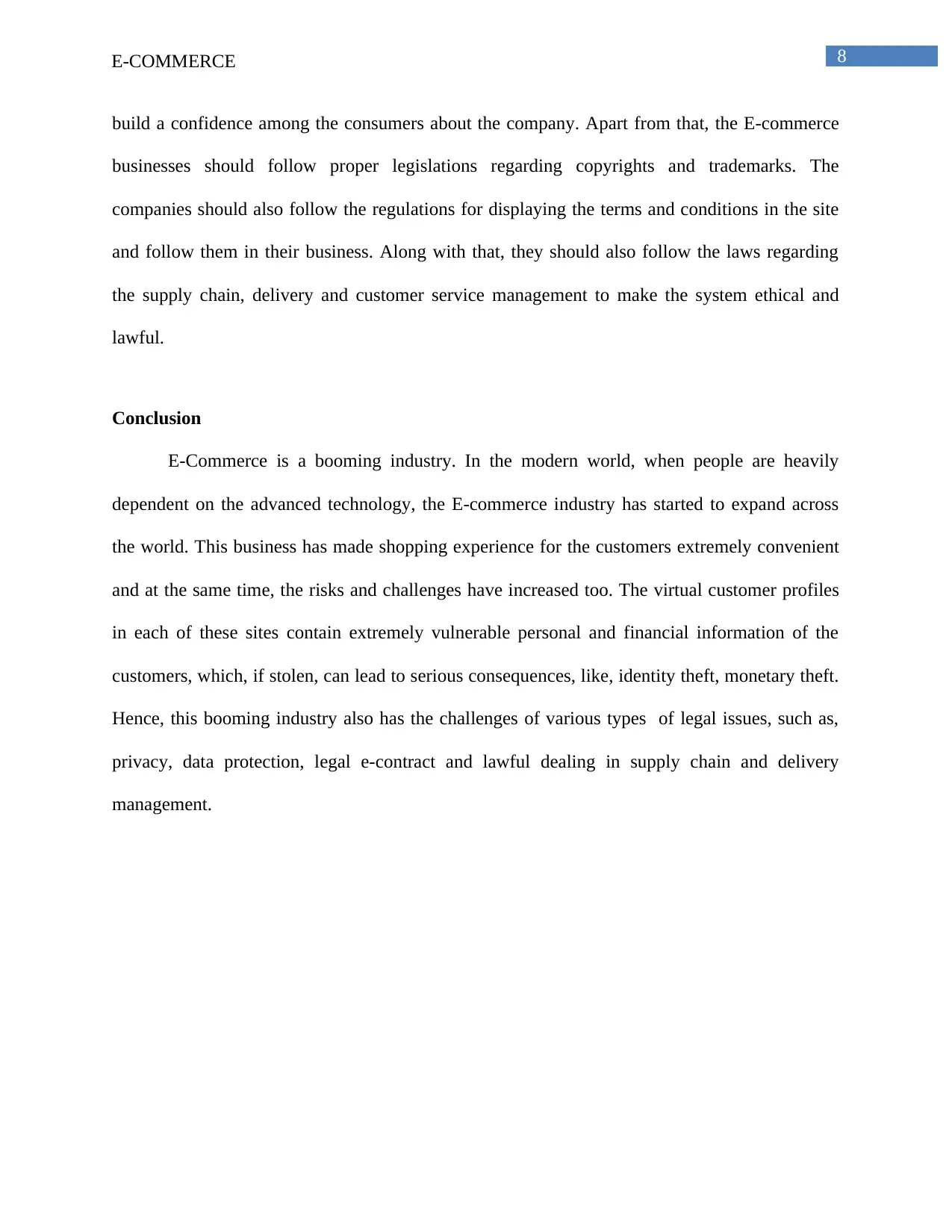
8E-COMMERCE
build a confidence among the consumers about the company. Apart from that, the E-commerce
businesses should follow proper legislations regarding copyrights and trademarks. The
companies should also follow the regulations for displaying the terms and conditions in the site
and follow them in their business. Along with that, they should also follow the laws regarding
the supply chain, delivery and customer service management to make the system ethical and
lawful.
Conclusion
E-Commerce is a booming industry. In the modern world, when people are heavily
dependent on the advanced technology, the E-commerce industry has started to expand across
the world. This business has made shopping experience for the customers extremely convenient
and at the same time, the risks and challenges have increased too. The virtual customer profiles
in each of these sites contain extremely vulnerable personal and financial information of the
customers, which, if stolen, can lead to serious consequences, like, identity theft, monetary theft.
Hence, this booming industry also has the challenges of various types of legal issues, such as,
privacy, data protection, legal e-contract and lawful dealing in supply chain and delivery
management.
build a confidence among the consumers about the company. Apart from that, the E-commerce
businesses should follow proper legislations regarding copyrights and trademarks. The
companies should also follow the regulations for displaying the terms and conditions in the site
and follow them in their business. Along with that, they should also follow the laws regarding
the supply chain, delivery and customer service management to make the system ethical and
lawful.
Conclusion
E-Commerce is a booming industry. In the modern world, when people are heavily
dependent on the advanced technology, the E-commerce industry has started to expand across
the world. This business has made shopping experience for the customers extremely convenient
and at the same time, the risks and challenges have increased too. The virtual customer profiles
in each of these sites contain extremely vulnerable personal and financial information of the
customers, which, if stolen, can lead to serious consequences, like, identity theft, monetary theft.
Hence, this booming industry also has the challenges of various types of legal issues, such as,
privacy, data protection, legal e-contract and lawful dealing in supply chain and delivery
management.
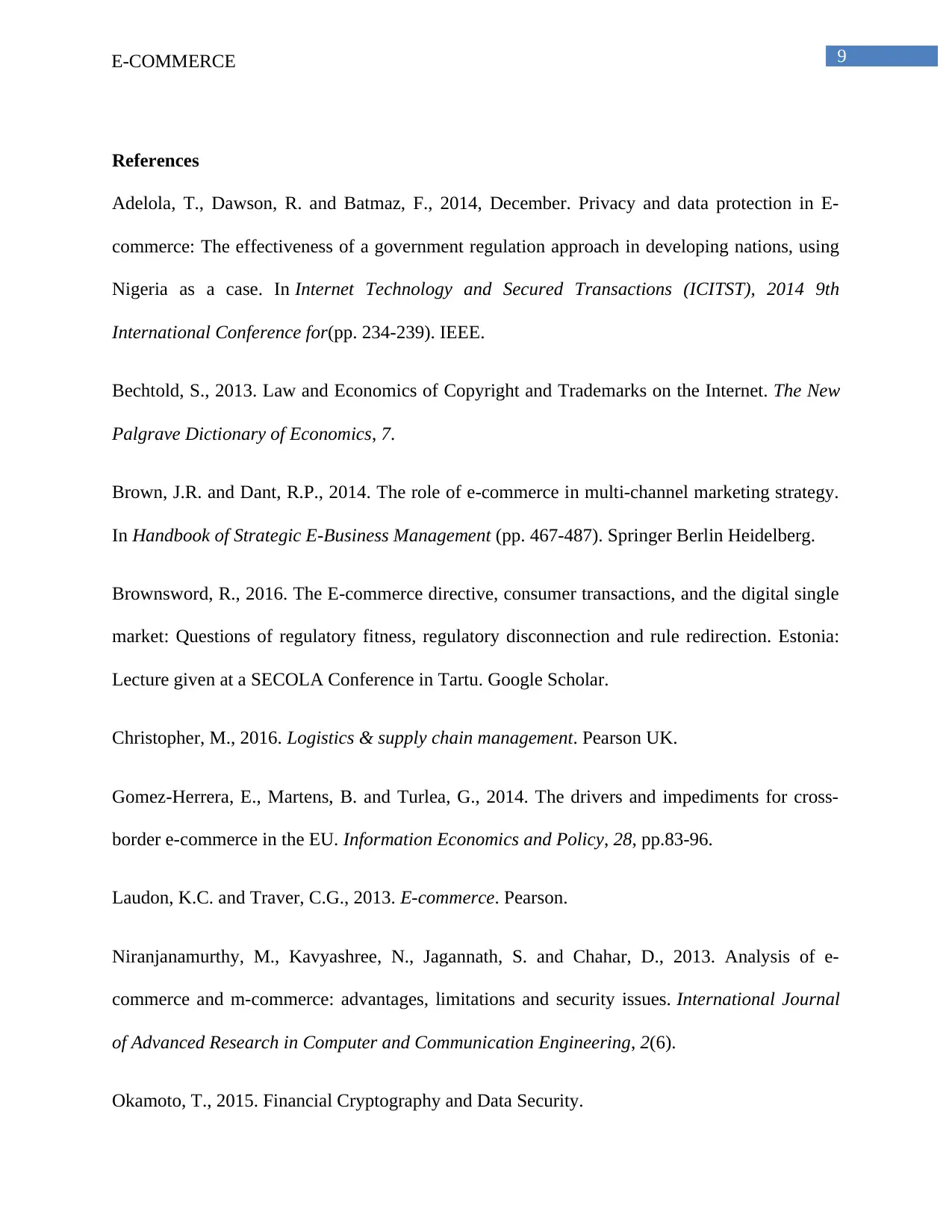
9E-COMMERCE
References
Adelola, T., Dawson, R. and Batmaz, F., 2014, December. Privacy and data protection in E-
commerce: The effectiveness of a government regulation approach in developing nations, using
Nigeria as a case. In Internet Technology and Secured Transactions (ICITST), 2014 9th
International Conference for(pp. 234-239). IEEE.
Bechtold, S., 2013. Law and Economics of Copyright and Trademarks on the Internet. The New
Palgrave Dictionary of Economics, 7.
Brown, J.R. and Dant, R.P., 2014. The role of e-commerce in multi-channel marketing strategy.
In Handbook of Strategic E-Business Management (pp. 467-487). Springer Berlin Heidelberg.
Brownsword, R., 2016. The E-commerce directive, consumer transactions, and the digital single
market: Questions of regulatory fitness, regulatory disconnection and rule redirection. Estonia:
Lecture given at a SECOLA Conference in Tartu. Google Scholar.
Christopher, M., 2016. Logistics & supply chain management. Pearson UK.
Gomez-Herrera, E., Martens, B. and Turlea, G., 2014. The drivers and impediments for cross-
border e-commerce in the EU. Information Economics and Policy, 28, pp.83-96.
Laudon, K.C. and Traver, C.G., 2013. E-commerce. Pearson.
Niranjanamurthy, M., Kavyashree, N., Jagannath, S. and Chahar, D., 2013. Analysis of e-
commerce and m-commerce: advantages, limitations and security issues. International Journal
of Advanced Research in Computer and Communication Engineering, 2(6).
Okamoto, T., 2015. Financial Cryptography and Data Security.
References
Adelola, T., Dawson, R. and Batmaz, F., 2014, December. Privacy and data protection in E-
commerce: The effectiveness of a government regulation approach in developing nations, using
Nigeria as a case. In Internet Technology and Secured Transactions (ICITST), 2014 9th
International Conference for(pp. 234-239). IEEE.
Bechtold, S., 2013. Law and Economics of Copyright and Trademarks on the Internet. The New
Palgrave Dictionary of Economics, 7.
Brown, J.R. and Dant, R.P., 2014. The role of e-commerce in multi-channel marketing strategy.
In Handbook of Strategic E-Business Management (pp. 467-487). Springer Berlin Heidelberg.
Brownsword, R., 2016. The E-commerce directive, consumer transactions, and the digital single
market: Questions of regulatory fitness, regulatory disconnection and rule redirection. Estonia:
Lecture given at a SECOLA Conference in Tartu. Google Scholar.
Christopher, M., 2016. Logistics & supply chain management. Pearson UK.
Gomez-Herrera, E., Martens, B. and Turlea, G., 2014. The drivers and impediments for cross-
border e-commerce in the EU. Information Economics and Policy, 28, pp.83-96.
Laudon, K.C. and Traver, C.G., 2013. E-commerce. Pearson.
Niranjanamurthy, M., Kavyashree, N., Jagannath, S. and Chahar, D., 2013. Analysis of e-
commerce and m-commerce: advantages, limitations and security issues. International Journal
of Advanced Research in Computer and Communication Engineering, 2(6).
Okamoto, T., 2015. Financial Cryptography and Data Security.
Secure Best Marks with AI Grader
Need help grading? Try our AI Grader for instant feedback on your assignments.
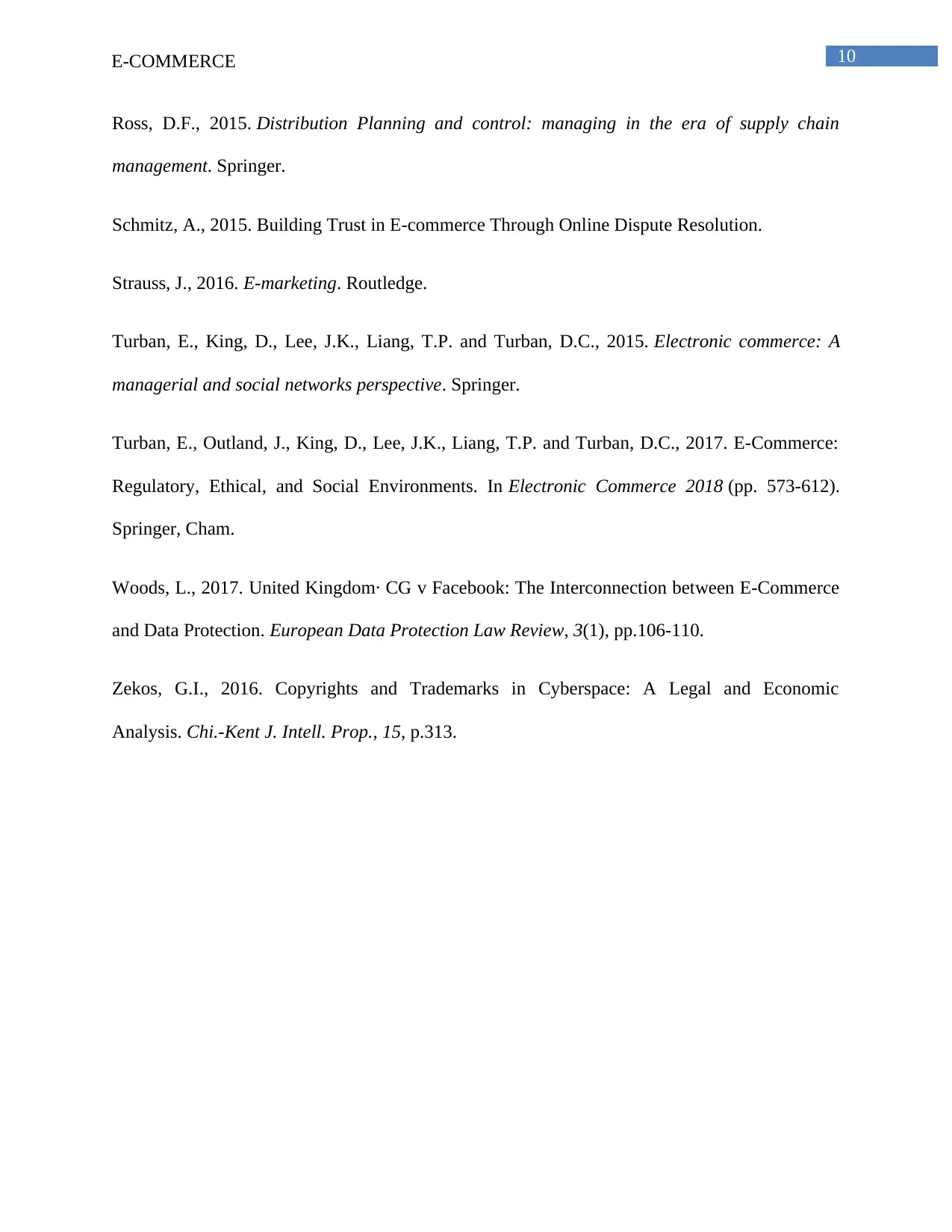
10E-COMMERCE
Ross, D.F., 2015. Distribution Planning and control: managing in the era of supply chain
management. Springer.
Schmitz, A., 2015. Building Trust in E-commerce Through Online Dispute Resolution.
Strauss, J., 2016. E-marketing. Routledge.
Turban, E., King, D., Lee, J.K., Liang, T.P. and Turban, D.C., 2015. Electronic commerce: A
managerial and social networks perspective. Springer.
Turban, E., Outland, J., King, D., Lee, J.K., Liang, T.P. and Turban, D.C., 2017. E-Commerce:
Regulatory, Ethical, and Social Environments. In Electronic Commerce 2018 (pp. 573-612).
Springer, Cham.
Woods, L., 2017. United Kingdom∙ CG v Facebook: The Interconnection between E-Commerce
and Data Protection. European Data Protection Law Review, 3(1), pp.106-110.
Zekos, G.I., 2016. Copyrights and Trademarks in Cyberspace: A Legal and Economic
Analysis. Chi.-Kent J. Intell. Prop., 15, p.313.
Ross, D.F., 2015. Distribution Planning and control: managing in the era of supply chain
management. Springer.
Schmitz, A., 2015. Building Trust in E-commerce Through Online Dispute Resolution.
Strauss, J., 2016. E-marketing. Routledge.
Turban, E., King, D., Lee, J.K., Liang, T.P. and Turban, D.C., 2015. Electronic commerce: A
managerial and social networks perspective. Springer.
Turban, E., Outland, J., King, D., Lee, J.K., Liang, T.P. and Turban, D.C., 2017. E-Commerce:
Regulatory, Ethical, and Social Environments. In Electronic Commerce 2018 (pp. 573-612).
Springer, Cham.
Woods, L., 2017. United Kingdom∙ CG v Facebook: The Interconnection between E-Commerce
and Data Protection. European Data Protection Law Review, 3(1), pp.106-110.
Zekos, G.I., 2016. Copyrights and Trademarks in Cyberspace: A Legal and Economic
Analysis. Chi.-Kent J. Intell. Prop., 15, p.313.
1 out of 11
Related Documents
Your All-in-One AI-Powered Toolkit for Academic Success.
+13062052269
info@desklib.com
Available 24*7 on WhatsApp / Email
![[object Object]](/_next/static/media/star-bottom.7253800d.svg)
Unlock your academic potential
© 2024 | Zucol Services PVT LTD | All rights reserved.




